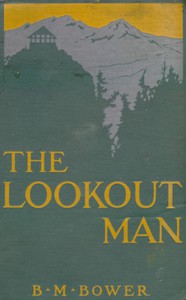The Lookout Man by B. M. Bower (good books to read for adults .txt) 📗

- Author: B. M. Bower
Book online «The Lookout Man by B. M. Bower (good books to read for adults .txt) 📗». Author B. M. Bower
By the depot clock it was five minutes to five. A train was being called, and the sing-song chant informed him that it was bound for "Sa-anta Bar-bra—Sa-an Louis Oh-bispo—Sa-linas—Sa-an 'Osay—Sa-an Fransisco, and a-a-ll points north!"
Jack, with his rubber boots flapping on his back, took a run and a slide to the ticket window and bought a ticket for San Francisco, thinking rather feverishly of the various points north.
CHAPTER THREE
TO THE FEATHER RIVER COUNTRY AND FREEDOM
In the chair car, where he plumped himself into a seat just as the train began to creep forward, Jack pulled his hat down over his eyebrows and wondered if any one had recognized him while he was getting on the train. He could not tell, because he had not dared to seem anxious about it, and so had not looked around him. At any rate he had not been stopped, though the police could wire ahead and have him dragged off the train at any station they pleased. Panic once more caught him and he did not dare look up when the conductor came for his ticket, but held his breath until the gloomy, haggard-faced man had tagged him and passed on. Until the train had passed Newhall and was rattling across the flat country to the coast, he shivered when any one passed down the aisle.
Beyond San Francisco lay the fog bank of the unknown. With his fishing outfit he could pass unquestioned to any part of that mysterious, vague region known as Northern California. The Russian River country, Tahoe, Shasta Springs, Feather River—the names revolved teasingly through Jack's mind. He did not know anything about them, beyond the fact that they were places where fellows went for sport, and that he hoped people would think he went for sport also. His wading boots and his rod and creel would, he hoped, account for any haste he might betray in losing himself somewhere.
Lose himself he must. If he did not, if his mother got the chance to put him through the tearful third-degree system that women employ with such deadly certainty of success, Jack knew that he would tell all that he knew—perhaps more. The very least he could hope to reveal was the damning fact that he had not been to Mount Wilson that day. After that the rest would not need to be told. They could patch up the evidence easily enough.
He tried to forget that man slipping down in the embrace of his friend. It was too horrible to be true. It must have been a trick just to scare the boys. The world was full of joshers—Jack knew half a dozen men capable of playing that trick, just to turn the joke. For a few minutes he was optimistic, almost making himself believe that the man had not been shot, after all. The fading effect of the wines he had drunk sent his mood swinging from the depths of panicky anguish over the horrible affair, to a senseless optimism that refused to see disaster when it stood by his side.
He tried again to decide where he should go from San Francisco. He tried to remember all that he had ever heard about the various paradises for sportsmen, and he discovered that he could not remember anything except that they were all in the mountains, and that Tahoe was a big lake, and lots of people went there in the summer. He crossed Tahoe off the list, because he did not want to land in some fashionable resort and bump into some one he knew. Besides, thirty-one dollars would not last long at a summer resort—and he remembered he would not have thirty-one dollars when he landed; he would have what was left after he had paid his fare from San Francisco, and had eaten once or twice.
Straightway he became hungry, perhaps because a porter came down the aisle announcing the interesting fact that breakfast was now being served in the diner—fourth car rear. Jack felt as though he could eat about five dollars' worth of breakfast. He was only a month or so past twenty-two, remember, and he himself had not committed any crime save the crime of foolishness.
He slid farther down upon his spine, pulled his nice new sombrero lower on the bridge of his tanned nose, and tried to forget that back there in the diner they would give him grapefruit on ice, and after that rolled oats with thick yellow cream, and after that ham and eggs or a tenderloin steak or broiled squab on toast; and tried to remember only that the check would make five dollars look sick. He wished he knew how much the fare would be to some of those places where he meant to lose himself. With all that classy-looking paraphernalia he would not dare attempt to beat his way on a freight. He had a keen sense of relative values; dressed as he was he must keep "in the part." He must be able to show that he had money. He sighed heavily and turned his back definitely upon a dining-car breakfast. After that he went to sleep.
At noon he was awake and too ravenous to worry so much over the possibility of being arrested for complicity in a murder. He collided violently with the porter who came down the aisle announcing luncheon. He raced back through two chair cars and a tourist sleeper, and he entered the dining car with an emphasis that kept the screen door swinging for a full half minute. He tipped the waiter who came to fill his water glass, and told him to wake up and show some speed. Any waiter will wake up for half a dollar, these hard times. This one stood looking down over Jack's shoulder while he wrote, so that he was back with the boullion before Jack had reached the bottom of the order blank—which is the reason why you have not read anything about a certain young man dying of starvation while seated at table number five in a diner, somewhere in the neighborhood of Paso Robles.
When he returned to his place in the chair car he knew he must try to find out what isolated fishing country was closest. So he fraternized with the "peanut butcher," if you know who he is: the fellow who is put on trains to pester passengers to death with all sorts of readable and eatable indigestibles.
He bought two packages of gum and thereby won favor. Then, nonchalantly picking up his wading boots and placing them in a different position, he casually asked the boy how the fishing was, up this way. The peanut butcher balanced his tray of chewing gum and candy on the arm of a vacant chair beside Jack, and observed tentatively that it was fine, and that Jack must be going fishing. Jack confessed that such was his intention, and the vender of things-you-never-want made a shrewd guess at his destination.
"Going up into the Feather River country, I bet. Fellow I know just come back. Caught the limit, he claims. They say Lake Almanor has got the best fishing in the State, right now. Fellow I know seen a ten-pounder pulled outa there. He brought back one himself that tipped the scales at seven-and-a-half. He says a pound is about as small as they run up there. I'm going to try to





Comments (0)